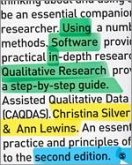This book is a 'survival guide' for students and researchers who would like to conduct a qualitative study with limited resources. Brinkmann shows how everyday life materials such as books, television, the internet, the media and everyday conversations and interactions can help us to understand larger social issues. As living human beings in cultural worlds, we are constantly surrounded by 'data' that call for analysis, and as we cope with the different situations and episodes of our lives, we are engaged in understanding and interpreting the world as a form of qualitative inquiry. The book helps its reader develop a disciplined and analytic awareness informed by theory, and shows how less can be more in qualitative research. Each chapter introduces theoretical tools to think with, and demonstrates how they can be put to use in working concretely with everyday life materials.
Hinweis: Dieser Artikel kann nur an eine deutsche Lieferadresse ausgeliefert werden.
Hinweis: Dieser Artikel kann nur an eine deutsche Lieferadresse ausgeliefert werden.








